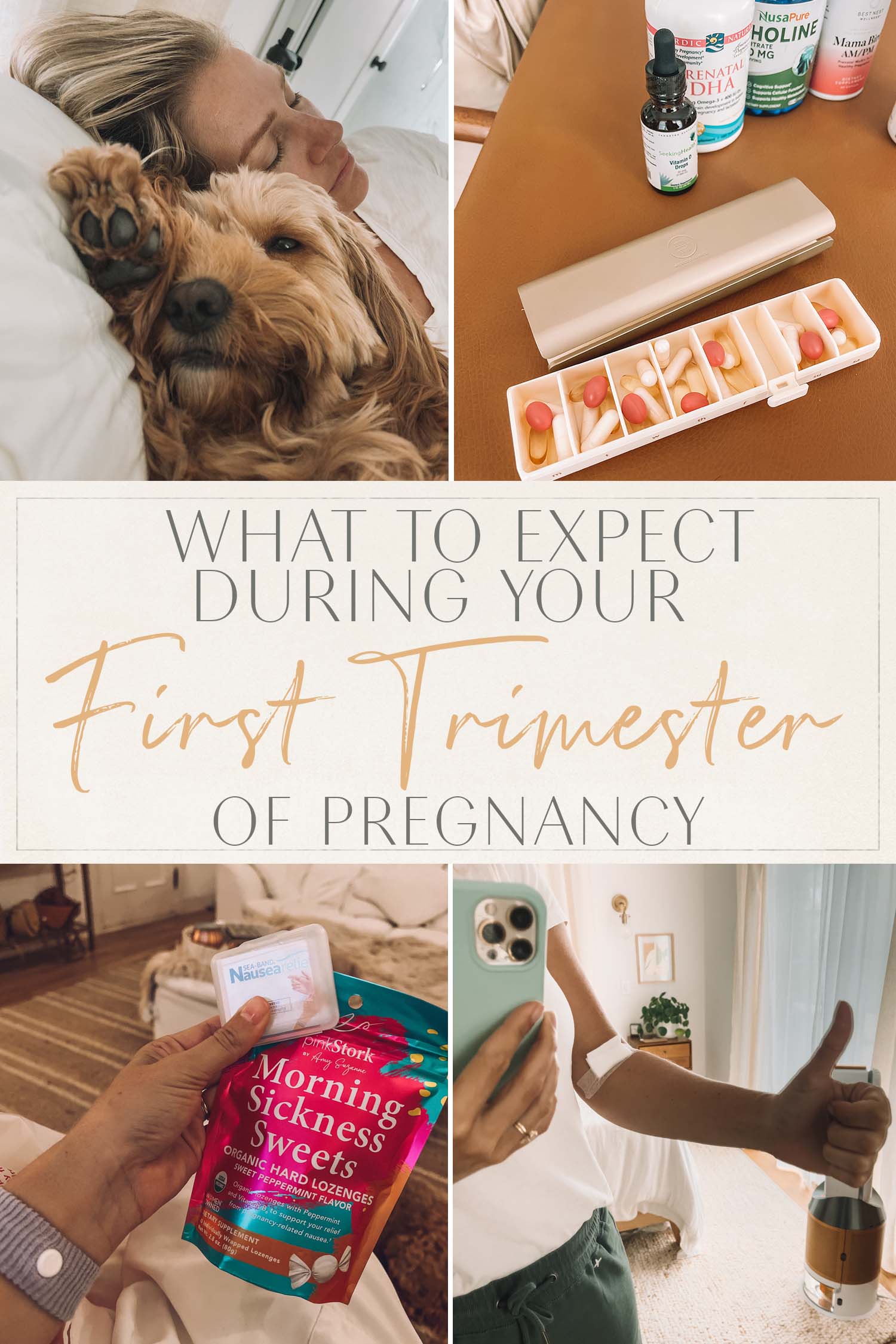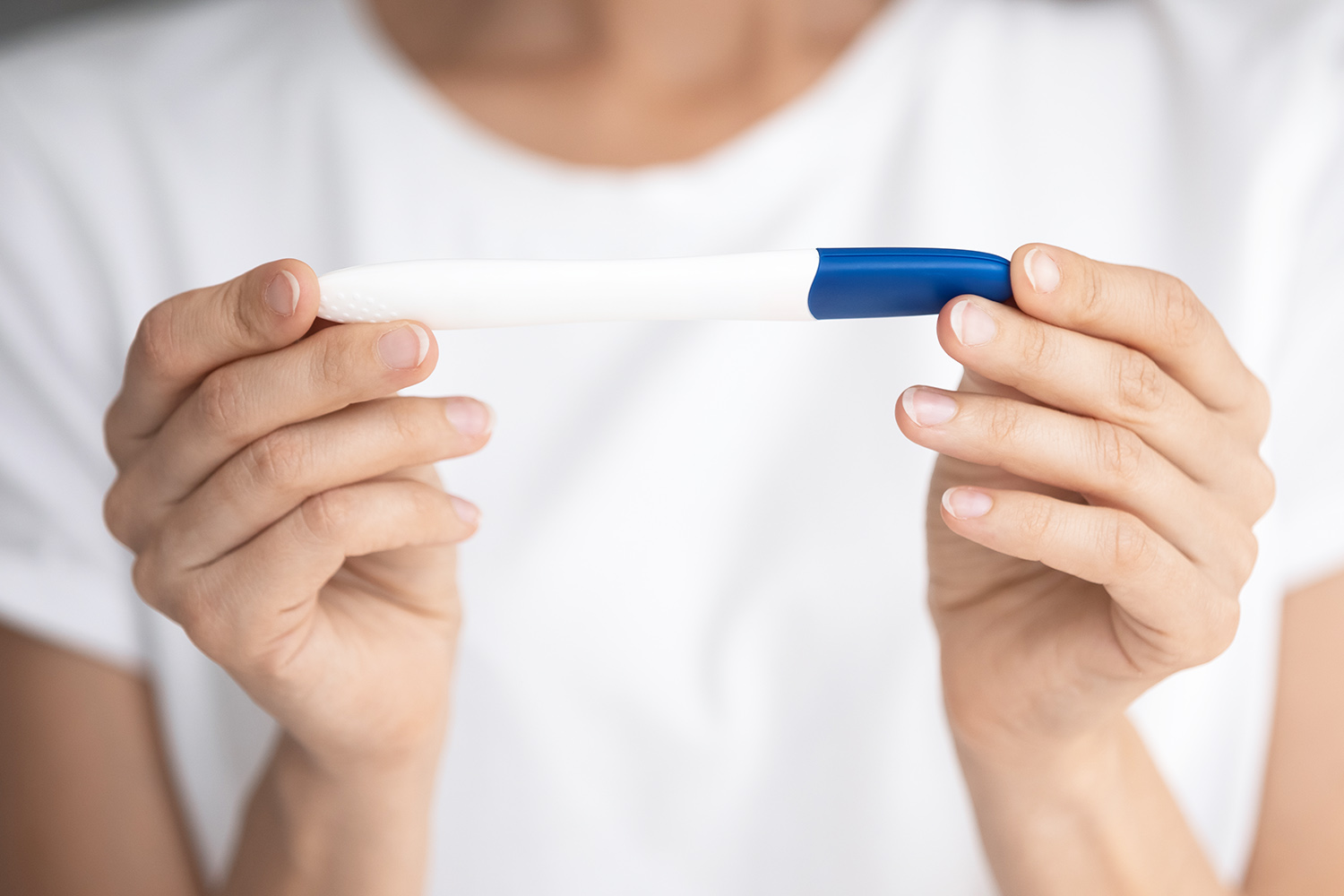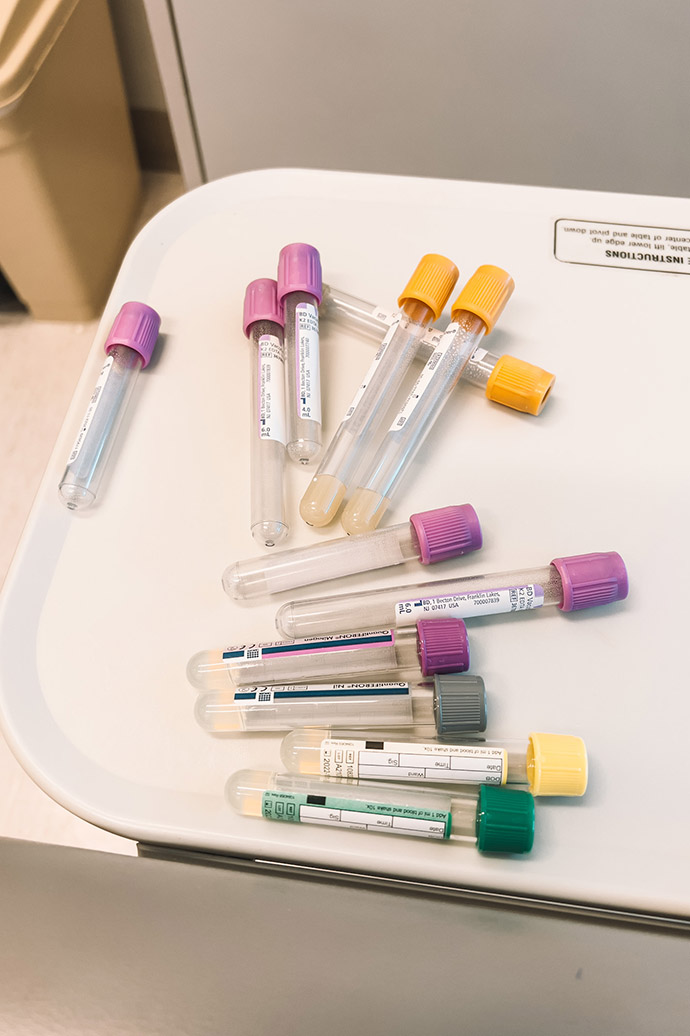What to Expect During Your First Trimester of Pregnancy • The Blonde Abroad

2022 will be our biggest adventure yet! We’re welcoming “The Baby Abroad” in June and we could not be more anxious (or unprepared) for this new chapter, but we also could not be more excited!
Whether you’re reading this because you’re curious, you’re trying to conceive, or you’re already pregnant, I wanted to include a little bit about my pre-pregnancy journey along with what I experienced in my first trimester so that you can use that information at any point in your own journey.
For those of you who have been following me on social media, you might be aware that I experienced an ectopic pregnancy and was hospitalized in January 2021.
I plan to talk more about my pregnancy journey and how long we tried, but I wanted to skip over that for now and I’ll save that for another blog post.
From pre-pregnancy things to a week-by-week breakdown, here’s what to expect during your first trimester of pregnancy!
![]()
Things to Know Pre-Pregnancy
Trying to Conceive (TTC)
Here’s a brief overview of my tips if you’re in the phase of trying to conceive (TTC). Just a note — these are not tips for “how to conceive” (it’s not THAT kind of blog lol) — but rather these are things to do to help yourself prepare mentally and physically.
- Start taking a prenatal — I alternated between Mama Bird and Actif Organic
- Read or listen to “It Starts with the Egg” (No book is 100% perfect, but I appreciated the scientific approach to this book)
- Consider testing your fertility (even if you aren’t planning on trying yet)
- Modern Fertility has a great test for this
- Also, remember fertility isn’t just the woman, so it’s worth having your partner get tested as well
- Visit your gynecologist and discuss what health checks you should have (pap, bloodwork, etc)
- Watch this series on YouTube
- Getting pregnant isn’t about getting lucky (there is actual science to it and it’s good to educate yourself on your fertility cycle even before you’re ready to start trying)
- Establish care with an OBGYN ASAP. It took me six months to get in with my preferred OBGYN, so you want to do this as soon as you think about starting a family.
*I’m working on a much more detailed blog post about fertility and our pre-pregnancy story, so stay tuned for that!
Reduce Environmental Toxins
A big part of the messaging in “It Starts with the Egg” is about reducing our exposure to the yucky stuff we expose ourselves to every day.
In the modern world, there are so many chemicals and toxins like BPA from plastic and even fragrances used in laundry detergent. A lot of these toxins are endocrine disrupters, meaning they are scientifically proven to affect your hormones/fertility.
I swapped out all of our household cleaning products to eco-friendly products years ago. It’s something I highly recommend not only for yourself but to baby-proof your house.
Some of my favorite (and easy) eco-home upgrades:
Update Your Makeup & Beauty Products
This is also something I’d recommend starting before you’re pregnant. Just like household products, so many of our beauty products and toiletries have yucky chemicals and endocrine disruptors.
There are so many clean beauty products out there that it’s a super easy switch—and doesn’t need to be expensive! A few of the big things you’ll need to give up once pregnant are:
- Retinol
- Salicylic Acid
- Chemical Sunscreens
Here’s a complete list of cosmetic and beauty ingredients to avoid while TTC and once pregnant.
![]()

Things to Know for Your First Trimester
Your First Trimester Lasts Weeks 1-12
These are all the things I wish I knew before I got pregnant! This is a round-up of all the information I could think of.
Read or Audiobook: Brain Health from Birth
Here’s a link to the book: Brain Health from Birth
- This is the same author as “It Starts with the Egg” and it includes a bunch of tips for pregnancy
- I followed a lot of her guidelines for detoxifying our home and my cosmetics/skincare as well
- She digs deep on endocrine disruptors in our environment and things that are in baby products so I enjoyed the education and it helped me prep and choose what to put on my baby registry
- Debunks breast is best, shares scientific data on vaccines—it’s a very unbiased, scientific approach to pregnancy and fetal development
Take Supplements
Note: Most OBs will only recommend a prenatal vitamin and Omega 3 + DHA, but after reading Brain Health from Birth, I decided to include Choline and Vitamin D3. They’re meant to support cognitive development in the fetus, so I’m just doing what I can to nurture a future genius. 😉
The Best Pregnancy Apps
I actually use all four of these pregnancy apps because I don’t think one covers it all! All of these apps are free and I tend to toggle between all four, it’s not necessary but I love being as informed as possible.
-
- What to Expect: This is the popular “What Fruit Size is My Baby” app
- WebMD Pregnancy: More medical-based, this has a lot of videos for the anatomy of your pregnancy and what’s happening to your body and to the baby.
- Nurture: I used Flo to track my cycle for years and this is their pregnancy app. It’s not all that great but it has all my cycle history through the years.
- BabyCenter: A mix of all of the above
Pregnancy Toiletries
Most of these things I was already using as I love sticking to clean beauty and as many organic/non-toxic products as possible. But, I have added belly oil and belly lotion to my routine!
Pregnancy Skincare/Beauty Products
- Cleanser/Toner/Serums/Moisturize: I swapped full to Laurel Skin once I was pregnant. They’re a local CA brand and fully plant-based skincare line.
- Tinted Super Serum/Mascara/Blush/Lip Mask: I also use mostly all ILIA, which is a clean beauty brand
Additional Pregnancy Products
Depending on how you’re growing and how you’re feeling… I didn’t need a ton during my first trimester, though I did add a pregnancy full body pillow as the weeks went on.
Maternity Clothes: While things might still fit you, you may already need maternity clothes or be on the cusp. It’s perfectly normal to experience significant weight gain in the first trimester, so don’t be surprised if you’re needing to upgrade your pants for maternity ones. I’ll be putting together a full post about my favorite maternity brands!
Compression Socks: If you plan on flying or traveling or if you’re on your feet most of the day
Pregnancy Pillow: This pillow is a bit of a splurge, but it’s SO worth it. I usually sleep on my back but being pregnant, it’s advised to sleep on your side, so you don’t cut off the baby’s supply which can result in stillbirth.
While I didn’t *actually* need a pregnancy pillow that early on, I’m so used to sleeping on my back that I wanted to get a jumpstart to get used to it. If you’re already a side sleeper, you might not need this — you could opt to put a pillow in between your legs and maybe one on your back so you don’t roll over.
Weeks 1-3 of Pregnancy
I didn’t know I was pregnant yet!
Depending on your cycle, you’ll find out you’re pregnant after your next missed period and SURPRISE your pregnancy actually started being tracked from the day you started the previous period.
This blew my mind, but if you have a positive test the day after your missed period, you’re probably more or less 4 weeks pregnant already (depending on your cycle).
This is why it’s good to track your periods before you start TTC!
You’ll want to be able to check your menstrual cycle as it will help you understand when you’re ovulating. Your OBGYN and nurses will also ask you the first day of your last period at your first few appointments, so you’ll want to track this and have it on hand.
You can notify your doctor/OBGYN as soon as you have a positive at-home test and have an HCG blood test ordered. HCG is the pregnancy hormone and it can tell if you are at a “normal” level for the stage you’re at in pregnancy.
![]()
Weeks 4-7 of Pregnancy
I immediately knew I was pregnant. That isn’t the case for everyone but my boobs and body just FELT different.
I also started to feel nausea (aka Morning Sickness) right away. I never got to the point of vomiting, but felt like I had a constant hangover my entire first trimester. I was exhausted and all my favorite foods sounded gross (hello, food aversion). Also, constipation is a real thing.
“First Trimester Hell” Survival Pack:
- Sea Sickness Wristbands
- Nausea Candies
- Crackers, bland foods, toast
- Sour things: Pickles, citrus, and glasses of OJ
- Fiber—Get this in your system with lots of water EVERY day. Hemorrhoids are very common in pregnancy so you want to do whatever you can to keep your gut in check.
- HYDRATE! Luckily my nausea forced me to chug water constantly but it definitely helps with all yucky pregnancy symptoms
- REST! I’m an extremely ‘busy’ person and it was very hard for me to slow down in my first trimester. But take all the naps and get as much rest as you can. You don’t need to be the most productive version of yourself during this time!
![]()
Weeks 8-12 of Pregnancy
8-Week Appointment:
Typically, you’ll have your first prenatal appointment at 8 weeks. It can feel like an eternity waiting for this appt, but there isn’t anything to see on an ultrasound for a few weeks, so they wait until you are farther along to have your first appointment.
What I Experienced at My 8-Week Appointment:
I didn’t meet with my OBGYN. A nurse did my full appointment/exam which took about an hour. I had lots of questions prepared and they’ll provide you with a packet of information and share a LOT of information as well.
- Full physical (breast and pelvic exam)
- If you haven’t had a PAP or are overdue they will suggest it
- Transvaginal Ultrasound: This is a wand-like tool that does an ultrasound inside of you.
- You should be able to see the yolk and sac and a tiny fetus at this appointment 🙂
- PAP
- I was up-to-date on my PAP so I didn’t need one, but if you are due, they will do a PAP at this appt
- Bloodwork (12 vials)
- I had a LOT of tests done as I opted to be tested for just about everything from my blood type to STDs to antibodies against viruses like chickenpox
Before leaving, I also scheduled EVERY appointment for my pregnancy through my 6-week postpartum appointment! You will have an appointment every 4 weeks and eventually every 2 weeks and every week as you approach your due date.
![]()
My Tips for Helping a Fear of Needles
I used to go in for blood work and would walk right back out because I couldn’t bring myself to do it…the fear of needles is REAL!
1. Request a small needle (23 gauge) — this is the smallest gauge needle for blood draws that’s usually used on children or people with small veins. I always had this image of a fat needle being used for blood draws but they’re actually super tiny and you shouldn’t feel a thing.
2. Take a few deep breaths to calm yourself. I usually ask the nurse to let me take some deep breaths and they’re always angels about it and stand back while I mentally prepare.

3. Cry if you need to. I only started getting to the point where I don’t fully panic and cry just before. It’s a huge emotional release and actually does help so long as you can breathe through it and calm yourself.
4. Request an ice pack or lie down if it helps. Placing an ice pack on the back of your neck will trick your body into focusing on the cold spot vs your arm. Most labs also have options to draw lying down which can help calm you and prevent you from fainting.
5. Once the nurse is ready, ask them to count to 3. I pinch somewhere on my body and visualize the pinched spot at the count of 3. Usually, this prevents me from feeling anything.
![]()
Weeks 11-13 of Pregnancy
12-Week Appointment:
This visit was short and sweet. We didn’t do an ultrasound. My OBGYN simply listened to the heartbeat with a doppler. Depending on your doctor, you may suggest additional labs/vaccines at this appointment such as the flu shot, boosters, etc.
- Bloodwork
- Since I had my NIPT done, I didn’t do my 1st-trimester screening bloodwork but you’d have that bloodwork done anytime from 10 weeks on. These labs will screen for chromosomal abnormalities.
NT Ultrasound/Labs:
Between your routine visits with your OBGYN, you’ll also have ultrasounds and various testing done.
Between weeks 11-13, you will schedule an ultrasound for a nuchal translucency screening. This ultrasound is done on your belly and the technician will be taking some measurements to physically check for chromosomal abnormalities such as Down Syndrome.
NIPT (Noninvasive Prenatal Testing):
I personally opted to have my NIPT done at 12 weeks. It’s a test that can be done anytime after 9 weeks (depending on the lab). It’s a simple blood draw that tests for chromosomal abnormalities (like Down Syndrome) and can also detect the sex of your baby.
From my experience, if you are under 35 years old, insurance may or may not cover this test. For genetic testing during pregnancy first trimester, my medical provider quoted me a flat $299 out of pocket. If you are 35 or older, you will most likely be encouraged to take the test and it will most likely be covered by insurance.
If this is something you want to do, talk to your OBGYN about your options at your first appointment.
I’ll be sharing the second installment of this sharing my experience with my second trimester of pregnancy (as I’m currently in it)!
I am happy to report my nausea and morning sickness went away almost to the DAY of my second trimester. I have a lot more energy, food tastes good again, and I no longer feel nauseous 24/7!

